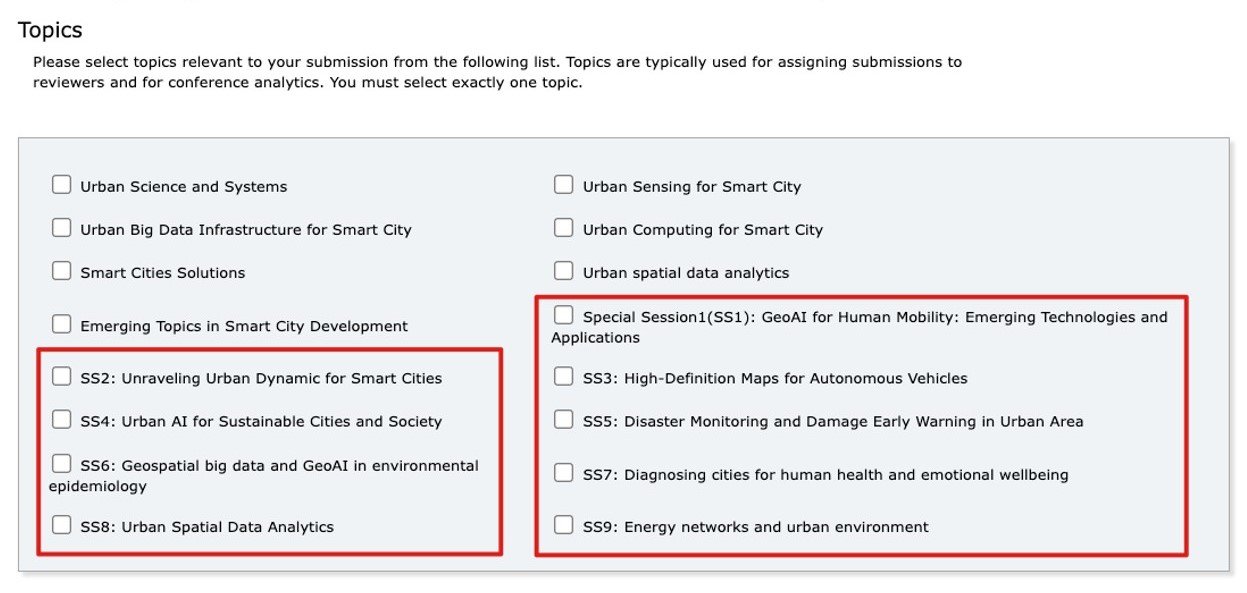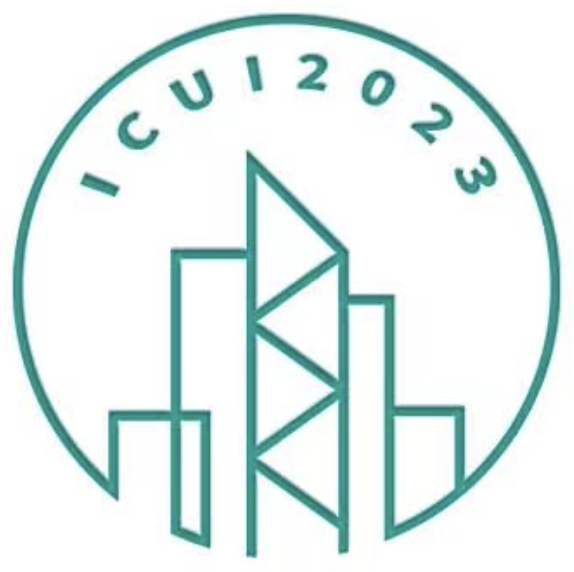Call for Submissions
- Abstract (200 - 300 words): submitted to https://easychair.org/my/conference?conf=icui2023
- Full paper: submitted to https://www.springer.com/journal/44212/submission-guidelines. Please select the special issue "Theoretical Development and Technology Innovation Towards Future Smart Cities (ICUI 2023)" for paper submission. If you want to compete for the Best Conference Paper Award, please make sure to submit your full paper through this channel for the opportunity to be published in the Urban Informatics journal.
Conference Topics:
We welcome topics in all aspects of Urban Informatics and Smart Cities. Themes include but are not limited to:
- Urban Science and Systems
- Smart Cities and Urban Science
- Energy Networks
- Smart Mobility
- Transport Systems
- Urban Metabolism
- Urban Spatial Structure
- Digital Twins
- Metaverse
- Urban Sensing for Smart City
- Ambient Sensing
- Urban Navigation and Positioning
- Urban Remote Sensing
- User Generated Content (UGC)
- AIoT
- Urban Big Data Infrastructure for Smart City
- Spatial Data Infrastructure (SDI)
- Spatial Search
- Urban Cyberinfrastructure
- Urban Big Data Characteristics
- Urban Computing for Smart City
- Technologies and Principles
- AI & Data Science
- FinTech and Blockchain
- Uncertainties and Data Governance
- Urban Models
- Edge Computing
- Privacy Preserving Computing
- Urban Spatial Data Analytics
- Classification of Urban Land Use and Land Cover
- Spatio-temporal Dynamics of Urban Growth
- Urban Geological Environment Monitoring
- Urban Ecological Environment Monitoring
- Urban Human Settlement Monitoring
- Smart Cities Solutions
- Human Health and Well-Being
- Urban Environment and Pollution
- Housing
- Transport
- Urban Ecology
- Urban Economy
- Urban Freight and Logistics
- Urban Governance
- Urban Risks and Resilience
- Emerging Topics in Smart City Development
- Autonomous Driving, High Definition (HD) Map
- Quantum Computing
- Post-pandemic Urban Design
- Urban Ageing
Special Sessions
- Abstract (200-300 words): submitted to https://easychair.org/conferences/?conf=icui2023
- Session selection: Please select the session name in the EasyChair submission system (see Special Sessions: SS1 - SS9 in the red box below)

Session 1:
GeoAI for Human Mobility: Emerging Technologies and Applications
Session chairs:
- Dr. Wei Tu, Shenzhen University
- Dr. Xu Yang, The Hong Kong Polytechnic University
Abstract: Recent advancements in big data, sensing technologies, and geospatial artificial intelligence (GeoAI) are transforming the ways we study and understand human mobility patterns. The increasing availability of massive mobility observations has provided new ingredients for developing innovative and GeoAI-empowered models and solutions. Therefore, the purpose of this session is to welcome scholars to discuss, showcase and envision emerging technologies and applications in GeoAI for Human Mobility. The relevant topics, include, but are not limited to, the following:
Topics to be covered:
- Emerging data sources and sensing technologies for human mobility and their integration with GeoAI;
- Spatio-temporal AI models for better prediction of individual and collective human mobility behaviors;
- GeoAI solutions for autonomous vehicles (AV) and electric vehicles (EV);
- Shared and mobility-on-demand systems;
- Privacy protection and ethics in human mobility research;
- Deep and reinforcement learning for smart mobility;
- Impact of generative AI (e.g., AIGC, ChatGPT) on human mobility research
Session 2:
Unraveling Urban Dynamic for Smart Cities
Session chairs:
- Prof. Min Chen, Nanjing Normal University
- Dr. Teng Zhong, Nanjing Normal University
Abstract: Urbanization poses significant challenges related to population growth, infrastructure development, environmental sustainability, and social inequality. Urban areas are complex systems that are constantly evolving and changing over time. Understanding urban dynamics is essential for addressing these challenges and designing effective policies and interventions that can shape the future of cities. The dynamic nature of cities makes understanding and predicting behavior challenging, which is essential for urban planning and management. Urban dynamic modeling and simulation offer a powerful approach to capturing urban systems' complexity, exploring different scenarios, and testing various interventions' impacts. This conference session aims to bring together researchers, practitioners , and stakeholders to share their experiences and discuss the latest advancements , applications, and challenges in urban dynamic modeling and simulation.
Topics to be covered:
- Advanced modeling techniques for urban dynamics, including agent-based modeling, cellular automata, system dynamics, and machine learning-based approaches
- Applications of urban dynamic models in various domains such as urban planning, transportation, energy, environment, and public health
- Integration of urban dynamic models with Geographic Information Systems (GIS) and remote sensing technologies for data collection, analysis, and visualization
- Network modeling and simulation of urban transportation systems
- Machine learning and artificial intelligence in urban dynamic modeling and simulation
- Real-time urban simulation and decision support systems
- Urban data collection, processing, and visualization for modeling and simulation
- Challenges and opportunities of using urban dynamic modeling and simulation in urban planning and policy-making
Session 3:
High-Definition Maps for Autonomous Vehicles
Session chairs:
- Prof. Wei Huang, Tongji University
- Prof. Shen Ying, Wuhan University
Abstract: High-definition maps digitize real-world objects in a high-resolution manner in terms of space and time, which can provide autonomous vehicles (AVs) useful information of their surroundings for navigation. With the HD maps, AVs can acquire the prior knowledge ranging from road environment to traffic events, which can be beneficial for machines' self-driving capabilities on, especially, local roads. However, challenges, such as standardized data modeling, efficient data updating technologies, HD map data interaction methods, etc., remain in the effectiveness of applying HD maps for full self-driving. This session focuses on new technologies, tools and models on the development of HD maps for self-driving cars.
Topics to be covered:
- Advanced modeling technologies for HD maps
- Crowdsourcing based methods for HD map updating
- Information interaction of HD map data
- New standards for HD map models and data interactions
- Data security issues for HD map update and employment
- AI for HD maps
- New hardware for HD map data acquisition
- Applications of HD maps
Session 4:
Urban AI for Sustainable Cities and Society
Session chairs:
- Prof. Xinyue Ye, Texas A&M University
- Prof. Wenzhong Shi, The Hong Kong Polytechnic University
- Prof. Tom Sanchez, Virginia Tech
- Prof. Soheil Sabri, The University of Melbourne
Abstract: Urban Artificial Intelligence (UAI) encompasses the utilization and advancement of artificial intelligence (AI) technologies and solutions in various urban contexts, including energy management, environmental monitoring, public safety, transportation, and predictive maintenance. Over the past few years, urban research has experienced a significant shift from a scarcity of data to an abundance of data. This transformation has been fueled by the integration of big data and computational algorithms into the fabric of urban environments and people's everyday lives, leading to a notable surge in digital twin research. The availability of diverse real-time data from a wide array of sources, such as sensors and cameras deployed in buildings, factories, green spaces, roads, sidewalks, and other urban elements, allows for the synthesis of heterogeneous datasets. This wealth of data presents opportunities for collaboration among different disciplines and stakeholders to address the complex challenges faced by cities. By leveraging UAI, we can bridge the gaps between design, social sciences, engineering, and practice. Collaborative activities such as citizen science, community-based research, and participatory research play a vital role in this process. This session aims to provide a platform for researchers, practitioners, and experts from diverse backgrounds to contribute their original research and innovative ideas to the ongoing discourse on Urban AI for Sustainable Cities and Society. We welcome submissions that explore the applications of UAI and its potential to foster sustainable urban development. We invite you to submit your contributions and engage in meaningful discussions to shape the future of Urban AI.
Topics to be covered:
- AI for Safer Cities and Rapid Emergency Response
- AI-Powered Environmental and Public Health Monitoring for Sustainable Cities
- Data-Driven Urban Design
- Enhancing Energy Efficiency through Urban AI
- Empowering Communities through AI-Enabled Citizen Services
- Exploring the scalability and replicability of AI solutions for sustainable cities
- Fairness, transparency, and accountability in AI systems for urban applications
- Transforming Urban Mobility with AI
Session 5:
Disaster Monitoring and Damage Early Warning in Urban Area
Session chairs:
- Dr. Lingli Zhao, Wuhan University
- Prof. Jie Yang, Wuhan University
Abstract: Large economic loss and threats to human safety and urban infrastructure have been caused by disasters or pollution, such as flooding, landslide, earthquake, debris flow, ground surface deformation and air pollution. It is important to monitor their temporal and spatial distribution of occurrence and to assess their effect on the social, environmental, and economic status of the affected urban region. The damage early warning and disaster monitoring in urban is very important for smart city. Although great progress has been made in the last two decades, there are still some uncertainties in the modeling and in the disaster monitoring, damage assessment and damage early warning in urban area.
Topics to be covered:
This special session focuses on the following topics: new models and applications
of multi sources remote sensing images in the monitoring and assessment of urban
flooding disaster, building and road damage assessment after post-earthquake, the
urban surface deformation caused by mining of groundwater and underground space
exploitation and the effect of deformation on the safety of basic infrastructure,
air pollution and urban heat island effect in urban area, the sound pollution in
urban area, the residential electricity consumption in war and other related topic
The new algorithms and applications of remote sensing technologies including optical
remote sensing, synthetic aperture radar (SAR), Nighttime Light Remote Sensing ,
LiDAR and other airborne based remote sensing, in the monitoring of the disaster
monitoring or damage early warning over urban area.
Session 6:
Geospatial big data and GeoAI in environmental epidemiology
Session chairs:
- Dr. Yimeng Song, Yale University
Abstract:
The recent emerging technology, such as geospatial artificial intelligence or GeoAI,
the advances in computing technologies, as well as the proliferation of multi-source
geospatial big data (e.g., remotely sensed imagery, social media data, cellular, and
IoT data), have created tremendous opportunities for researchers to tackle various
types of spatial optimization problems, taking into account new data sources and
novel technologies. This has significantly impacted the field of environmental
epidemiology, enabling a deeper understanding of the complex relationships between
the environment and human health. However, methodological innovation and technology
fusion pose challenges. These include data integration, quality, algorithm
development, ethics, and validation frameworks. Collaboration among researchers,
practitioners, and policymakers is crucial for responsible and effective utilization
of geospatial big data and GeoAI in environmental epidemiology.
This special session seeks cutting-edge research and innovative solutions in geospatial
big data and GeoAI in environmental epidemiology. We invite contributions from diverse
disciplines to advance our understanding of applications, methodologies, and
challenges. By exploring the synergies between geospatial big data, AI, and remote
sensing, we can foster interdisciplinary collaborations and evidence-based decision-making
in environmental health management.
Topics to be covered:
The special session welcomes submissions on a wide range of topics related to geospatial
big data, artificial intelligence, and remote sensing in the context of environmental
epidemiology. Potential areas of interest include, but are not limited to:
- Integration of geospatial big data and AI techniques in environmental exposure assessment.
- Development and application of GeoAI algorithms for disease mapping and risk assessment.
- Use of remote sensing data and machine learning for analyzing environmental factors influencing health outcomes.
- Spatial-temporal modeling and predictive analytics using geospatial big data in epidemiological studies.
- Applications of geospatial big data and GeoAI in the identification and management of environmental health disparities.
- Geospatial data fusion and integration for multi-source data analysis in environmental epidemiology.
- Big data analytics and visualization techniques for exploring spatio-temporal patterns of environmental health risks.
- Ethical considerations and challenges in utilizing geospatial big data and GeoAI for environmental epidemiology.
Session 7:
Diagnosing cities for human health and emotional wellbeing
Session chairs:
- Prof. Bin Jiang, Hong Kong University of Science and Technology (Guangzhou)
- Dr. Zheng Chen, Tongji University
Session 8:
Urban Spatial Data Analytics
Session chairs:
- Prof. Lizhe Wang, China University of Geosciences (Wuhan)
- Dr. Jining Yan, China University of Geosciences (Wuhan)
- Dr. Ruyi Feng, China University of Geosciences (Wuhan)
Abstract: The process of urbanization is accompanied by the expansion of urban area, population growth and GDP increase. However, urbanization has also caused ecological and geological environmental effects such as air pollution, water pollution, urban heat island, land subsidence, and landslides. Big Earth data, such as remote sensing data, has played an important role in monitoring the dynamic changes of urban land use, human settlements, ecological environment, and geological environment due to its advantages of uninterrupted, objective, and all-round observation. In-depth mining and analysis of urban spatial big data is of great significance for understanding urban dynamics and their effects on ecology, human settlements, and geological environment, and making suggestions for urban planning and governance decisions. This conference session aims to bring together researchers, practitioners, and stakeholders to share their experiences and discuss the latest advancements, applications, and challenges in urban spatial data analytics.
Topics to be covered:
- Advanced classification techniques of urban land use and land cover, including rule-based approaches, data-driven approaches, reinforcement learning approaches, and ensemble methods of rule-based, data-driven, and reinforced learning
- Spatio-temporal dynamics of urban growth, including semi-supervised, unsupervised, supervised urban land cover/use time-series change detection, etc.
- Urban geological environment monitoring, including the use of big earth data to carry out urban land subsidence monitoring, urban landslide monitoring, urban soil erosion risk assessment, urban debris flow risk early warning, etc.
- Urban ecological environment monitoring, including the use of big earth data to carry out urban air pollution monitoring, water pollution monitoring, wetland degradation monitoring, heat island effect analysis, and urban carbon emission monitoring, etc.
- Urban human settlement monitoring, including the use of big earth data to monitor population growth, GDP growth, and land use rate changes in the process of urbanization, etc.
- State-of-the-art spatial data analysis technologies related to urbanization process monitoring
Session 9:
Energy networks and urban environment
Session chairs:
- Dr. Rui Zhu, Institute of High Performance Computing (IHPC), Agency for Science, Technology and Research (A*STAR), Singapore
- Dr. Haoran Zhang, Peking University, China
Abstract:
Global cities occupy only 3% of Earth's land surface but account for 75% of all
CO2 emissions. Thus, cities are the main battlefields to achieve the United
Nations' Sustainable Development Goals on carbon neutrality and the Paris
Agreement's goal of mitigating global warming. To accomplish such goals,
it is important to promote the use of renewable energy sources and to reduce
dependency on conventional fossil fuels. For instance, to reduce carbon emission
and cool down the city, Singapore has massively installed building-integrated
photovoltaic systems and has established a large initiative to gradually phrase
out internal combustion vehicles with the replacement of electric vehicles in the
next decade.
However, effectively powering various urban systems with renewable energy faces
several challenges, such as intermittency, spatiotemporal heterogeneity, and energy
storage complexity. This session will focus on, but not limited to, energy-related
research topics, such as
Topics to be covered:
- renewable energy estimation (e.g., solar energy, wind energy, and tidal energy)
- building-integrated photovoltaics
- new energy vehicles (e.g., electric-vehicle networks, and electric-vehicle charging)
- urban environment (e.g., urban heat island, air pollution, and carbon mitigation capacity)
- economic feasibility assessment (e.g., techno-economic assessment)
- energy policy and policy implication (e.g., feed-in tariff)
- Macro - distributed - urban energy systems






